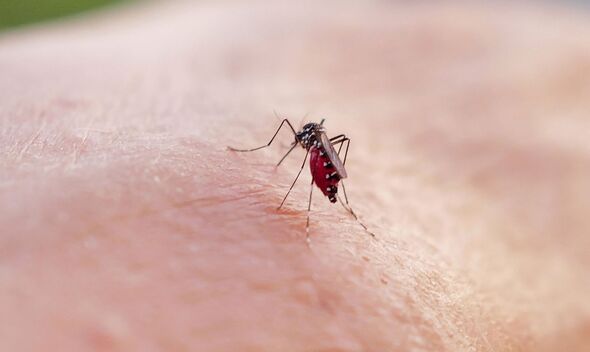French health officials are urging vigilance after the country recorded its first indigenous case of dengue fever this year.
The viral illness, which is spread by mosquitoes, was identified yesterday in the region of Herault, in the south of the country, by the Occitanie regional health agency (ARS)
A spokesman said: “The sick person has been taken into care and his state of health is not serious.”
The ARS confirmed it had deployed what it called “preventive measures” in the communes of Montpellier and Perols, to “avoid the spread of the virus locally”.
Dengue fever, sometimes nicknamed “bone break fever” in reference to the severe joint pains it can cause, is a viral disease which causes a high fever and, in rare cases, can develop into a more serious form with bleeding. In roughly 0.01 percent of cases, it results in death.
The ARS also announced that mosquito control operations are underway at the start of the week to “eliminate larval breeding sites and adult mosquitoes in the places where the sick person lives and visits”. A local survey identifies more people who may be ill.
An “indigenous case” means that the person has not recently travelled to regions where the virus, transmitted from person to person by tiger mosquitoes (Aedes albopictus), is widely circulating – for example, the West Indies.
The person was likely infected on the spot after being bitten by a tiger mosquito, whose presence in France and Corsica has been steadily rising for nearly two decades, partly as a result of global warming.
In 2023, France recorded about 50 indigenous cases of dengue fever, after a record 66 the previous year.
In mid-April, the health authorities warned of an “unprecedented” situation in France, connected to an outbreak of dengue fever in the Americas and the Caribbean, and urged heightened vigilance, particularly in the run-up to the Paris Olympics, when populations are likely to mix.
The latest statement added: “At the start of the tiger mosquito surveillance period (May 1), more than 200 imported cases of dengue fever had already been reported to the ARS, four times more than during the same period in 2023.
“This sharp rise means we need to be even more vigilant, especially if we travel to tropical regions currently experiencing unprecedented dengue epidemics (West Indies, Brazil).
“The ever-increasing presence of the tiger mosquito on our territory could lead to the long-term circulation of these viruses in mainland France, causing epidemics. This risk increases every year as a result of climate change and the globalisation of trade.”
The World Health Organisation’s latest update, published last month, describes dengue as “a mosquito-borne viral disease caused by the dengue virus” and one which “remains a serious global public health threat”.
The WHO statement added: “Dengue infections are the most common vector-borne viral infections worldwide, particularly impacting tropical and subtropical countries.
“In the last five years, there has been a substantial increase in the number of cases of dengue. This increase has been particularly pronounced in the Region of the Americas.
“Currently, 90 countries have known active dengue transmission in 2024, not all of which have been captured in formal reporting.”
As of April 30, more than 7.6 million dengue cases had been reported to WHO in 2024, including 3.4 million confirmed cases, more than 16,000 severe cases, and more than 3,000 deaths.
